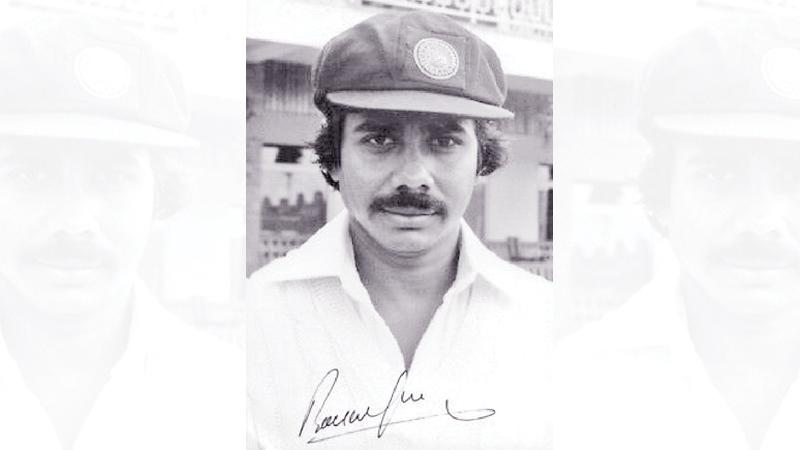
Anuradhapura in the north-central province and once the kingdom of power in ancient Ceylon is as enchanting as it is rustic with its teeming wildlife, cultural heritage and a population that relies mostly on farming with little or no entertainment frolics.
 But in August 1991 word went around that Sri Lanka’s first Test cricket captain Bandula Warnapura and his mates from Bloomfield Cricket Club were to play an exhibition match against a local district side.
But in August 1991 word went around that Sri Lanka’s first Test cricket captain Bandula Warnapura and his mates from Bloomfield Cricket Club were to play an exhibition match against a local district side.
When Warnapura and the rest, that also included a few invited journalists, arrived on the eve of the match they were greeted by a thunderstorm and the venue that was to host the tour party turned into a murky pond.
But much to the relief of everyone, the water had drained away the following day, the ground was match-fit and the flood had given way to a deluge of spectators in their thousands that mobbed the tour party’s bus. For the first time in their lives Anuradhapura’s population saw the iconic and charismatic figure of Warnapura, the first allrounder Anura Ranasinghe and a schoolboy star from Nalanda College in Chaminda Handunnettige.
There were girls and boys and grown-ups, some of them with watery eyes and it was the kind of sight that the rulers of cricket in the country did not want to see after they had ostracised Warnapura and others in a life ban most foul for making an unsanctioned tour of once apartheid South Africa.
With no Rights Groups in the country to take up their cause and only a limited Press to highlight their campaign, Warnapura and the rest succeeded in having their life bans end after nine years.
“We never murdered anybody or plotted to bring down a government. Those who have committed crime and murder in this country are living free to do anything they want,” he confided in journalists after he and his mates were stripped of their right to play cricket.
 Bandula Warnapura (R) lights the traditional oil lamp as chief guest at a function to felicitate umpires and scorers along with Tillekaratne Dilshan |
His last interaction with the media was in April this year when he announced his desire to contest the post of vice president of Sri Lanka Cricket but his entire camp withdrew in an apparent protest of a politicised election.
“We were schooled in cricket in the same way it was with our studies and cricket was the central part of our lives as we sacrificed a great deal. What we did (going to South Africa) is happening even today where players need to earn a living out of cricket and now there are many opportunities all over the world playing franchise cricket for money.
“What would you call those cricketers who turn their backs on the team and go to play franchise T20 cricket now,” he told the Sunday Observer on the sidelines of that last media interaction as if he had a premonition of something that was to occur.
Warnapura and his mates saw themselves as a group of cricketers some of them in the last stages of their careers, needing to grasp an opportunity. Moreover, they did not see themselves as usurpers of the rights of South African blacks, but rather as a group of brown neutral Asians indulging in sport that brings all races onto a single platform.
When he was named as Sri Lanka’s first captain in 1981, there wasn’t anyone else who could have fitted into that leadership slot and Warnapura was an all-rounder well educated in cricket who became an iconic figure even it it meant playing just four Test matches in the whole of his career.
He never forgot the role that Press reporters played to support the lifting of the ban after nine years and some of the ‘rebels’ including Warnapura were at least able to play domestic cricket in their late 30s.
But Warnapura and the rest were never the same, victims of an arrogant life ban. Their only consolation was witnessing their working class followers swarm the venue at Anuradhapura on that historic day which they marked in their diaries never to forget.
Unknown to many, it was Warnapura who pioneered the fitness test for cricketers that failed even the great Aravinda de Silva in 1994 after the team had returned from a disastrous Test tour of India with him as the coach.
Interestingly what Warnapura stood for or convicted himself to do is now a big part and parcel of cricket in present day scenarios where players in Sri Lanka and all over the world rush into T20 money-offerings while physical fitness has been made mandatory.
None will ever know how many cricketers would have moulded themselves on Warnapura had he not made that tour of South Africa in October 1982 that ended his playing days, for such was his technique and knowledge of the game, much above of what is being played and spoken in the present era.

Schoolboys from Nalanda College raise bats as the hearse carrying the coffin of Bandula Warnapura enters the General Cemetery in Borella, Colombo for the final rites (Pic by Sudath Malaweera)
